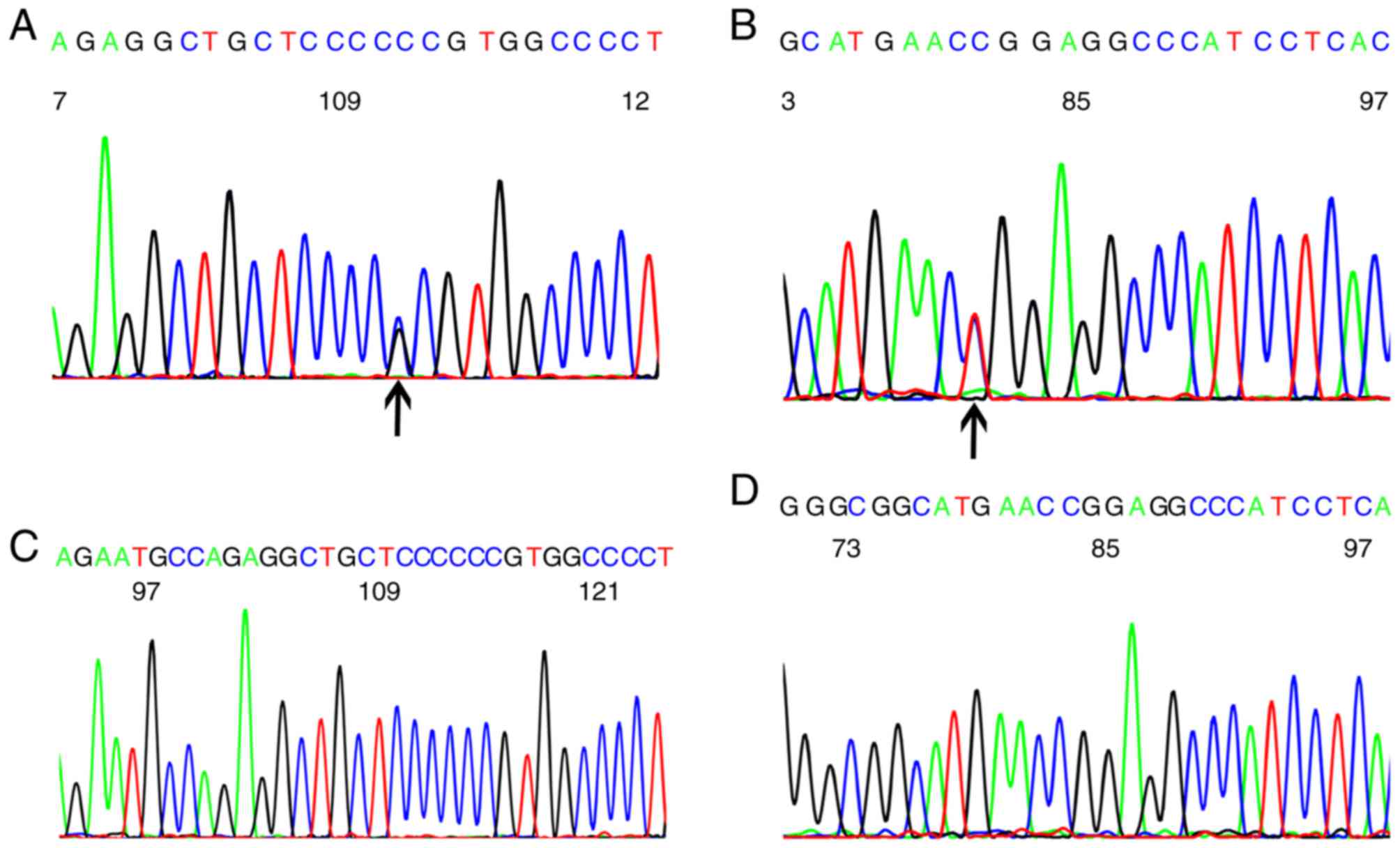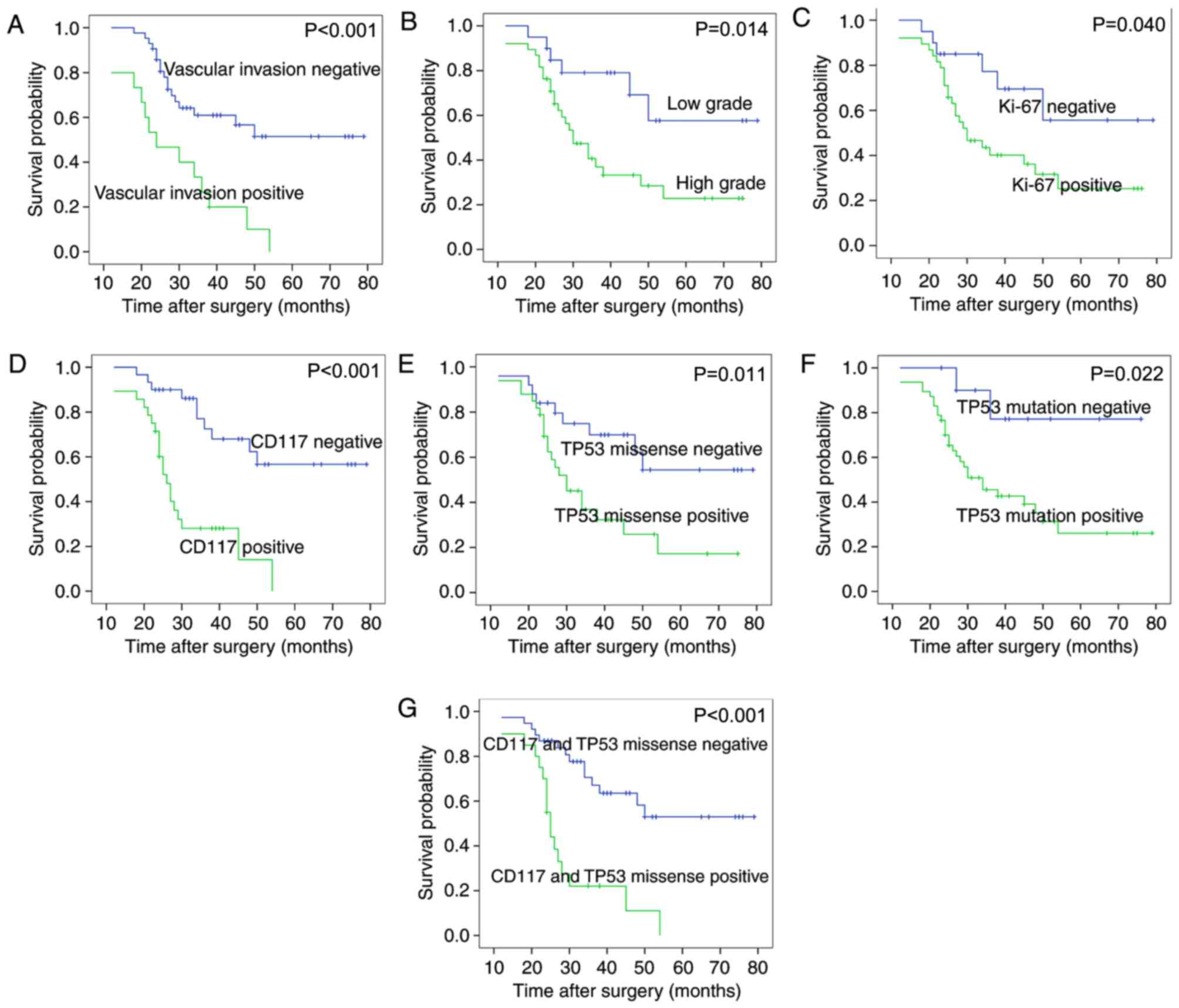|
1
|
Foulkes WD, Smith IE and Reis-Filho JS:
Triple-negative breast cancer. N Engl J Med. 363:1938–1948. 2010.
View Article : Google Scholar : PubMed/NCBI
|
|
2
|
Changavi AA, Shashikala A and Ramji AS:
Epidermal growth factor receptor expression in triple negative and
nontriple negative breast carcinomas. J Lab Physicians. 7:79–83.
2015. View Article : Google Scholar : PubMed/NCBI
|
|
3
|
Metzger-Filho O, Tutt A, de Azambuja E,
Saini KS, Viale G, Loi S, Bradbury I, Bliss JM, Azim HA Jr, Ellis
P, et al: Dissecting the heterogeneity of triple-negative breast
cancer. J Clin Oncol. 30:1879–1887. 2012. View Article : Google Scholar : PubMed/NCBI
|
|
4
|
Lasota J and Miettinen M: Clinical
significance of oncogenic KIT and PDGFRA mutations in
gastrointestinal stromal tumours. Histopathology. 53:245–266. 2008.
View Article : Google Scholar : PubMed/NCBI
|
|
5
|
Yoshida C, Tsuji AB, Sudo H, Sugyo A,
Kikuchi T, Koizumi M, Arano Y and Saga T: Therapeutic efficacy of
c-kit-targeted radioimmunotherapy using 90Y-labeled anti-c-kit
antibodies in a mouse model of small cell lung cancer. PLoS One.
8:e592482013. View Article : Google Scholar : PubMed/NCBI
|
|
6
|
Thike AA, Iqbal J, Cheok PY, Chong AP, Tse
GM, Tan B, Tan P, Wong NS and Tan PH: Triple negative breast
cancer: Outcome correlation with immunohistochemical detection of
basal markers. Am J Surg Pathol. 34:956–964. 2010. View Article : Google Scholar : PubMed/NCBI
|
|
7
|
Blassl C, Kuhlmann JD, Webers A, Wimberger
P, Fehm T and Neubauer H: Gene expression profiling of single
circulating tumor cells in ovarian cancer-Establishment of a
multi-marker gene panel. Mol Oncol. 10:1030–1042. 2016. View Article : Google Scholar : PubMed/NCBI
|
|
8
|
Fan H, Yuan Y, Wang J, Zhou F, Zhang M,
Giercksky KE, Nesland JM and Suo Z: CD117 expression in operable
oesophageal squamous cell carcinomas predicts worse clinical
outcome. Histopathology. 62:1028–1037. 2013. View Article : Google Scholar : PubMed/NCBI
|
|
9
|
Kashiwagi S, Yashiro M, Takashima T,
Aomatsu N, Kawajiri H, Ogawa Y, Onoda N, Ishikawa T, Wakasa K and
Hirakawa K: c-Kit expression as a prognostic molecular marker in
patients with basal-like breast cancer. Br J Surg. 100:490–496.
2013. View Article : Google Scholar : PubMed/NCBI
|
|
10
|
Medinger M, Kleinschmidt M, Mross K,
Wehmeyer B, Unger C, Schaefer HE, Weber R and Azemar M: c-kit
(CD117) expression in human tumors and its prognostic value: An
immunohistochemical analysis. Pathol Oncol Res. 16:295–301. 2010.
View Article : Google Scholar : PubMed/NCBI
|
|
11
|
Jansson S, Bendah PO, Grabau DA, Falck AK,
Fernö M, Aaltonen K and Rydén L: The three receptor tyrosine
kinases c-KIT, VEGFR2 and PDGFRα, closely spaced at 4q12, show
increased protein expression in triple-negative breast cancer. PLoS
One. 9:e1021762014. View Article : Google Scholar : PubMed/NCBI
|
|
12
|
Kim HW, Lee HM, Hwang SH, Ahn SG, Lee KA
and Jeong J: Patterns and biologic features of p53 mutation types
in Korean breast cancer patients. J Breast Cancer. 17:1–7. 2014.
View Article : Google Scholar : PubMed/NCBI
|
|
13
|
Kruiswijk F, Labuschagne CF and Vousden
KH: p53 in survival, death and metabolic health: A lifeguard with a
licence to kill. Nat Rev Mol Cell Biol. 16:393–405. 2015.
View Article : Google Scholar : PubMed/NCBI
|
|
14
|
Fernández-Cuesta L, Oakman C,
Falagan-Lotsch P, Smoth KS, Quinaux E, Buyse M, Dolci MS, Azambuja
ED, Hainaut P, Dell'orto P, et al: Prognostic and predictive value
of TP53 mutations in node-positive breast cancer patients treated
with anthracycline- or anthracycline/taxane-based adjuvant therapy:
Results from the BIG 02–98 phase III trial. Breast Cancer Res.
14:R702012. View Article : Google Scholar : PubMed/NCBI
|
|
15
|
Chae BJ, Bae JS, Lee A, Park WC, Seo YJ,
Song BJ, Kim JS and Jung SS: p53 as a specific prognostic factor in
triple-negative breast cancer. Jpn J Clin Oncol. 39:217–224. 2009.
View Article : Google Scholar : PubMed/NCBI
|
|
16
|
Olivier M, Langerød A, Carrieri P, Bergh
J, Klaar S, Eyfjord J, Theillet C, Rodriguez C, Lidereau R, Bièche
I, et al: The clinical value of somatic TP53 gene mutations in
1,794 patients with breast cancer. Clin Cancer Res. 12:1157–1167.
2006. View Article : Google Scholar : PubMed/NCBI
|
|
17
|
Foedermayr M, Sebesta M, Rudas M, Berghoff
AS, Promberger R, Preusser M, Dubsky P, Fitzal F, Gnant M, Steger
GG, et al: BRCA-1 methylation and TP53 mutation in triple-negative
breast cancer patients without pathological complete response to
taxane-based neoadjuvant chemotherapy. Cancer Chemother Pharmacol.
73:771–778. 2014. View Article : Google Scholar : PubMed/NCBI
|
|
18
|
Siemens H, Jackstadt R, Kaller M and
Hermeking H: Repression of c-Kit by p53 is mediated by miR-34 and
is associated with reduced chemoresistance, migration and stemness.
Oncotarget. 4:1399–1415. 2013. View Article : Google Scholar : PubMed/NCBI
|
|
19
|
Mittendorf EA, Ballman KV, McCall LM, Yi
M, Sahin AA, Bedrosian I, Hansen N, Gabram S, Hurd T, Giuliano AE
and Hunt KK: Evaluation of the stage IB designation of the American
Joint Committee on Cancer staging system in breast cancer. J Clin
Oncol. 33:1119–1127. 2015. View Article : Google Scholar : PubMed/NCBI
|
|
20
|
Penault-Llorca F, André F, Sagan C,
Lacroix-Triki M, Denoux Y, Verriele V, Jacquemier J, Baranzelli MC,
Bibeau F, Antoine M, et al: Ki67 expression and docetaxel efficacy
in patients with estrogen receptor-positive breast cancer. J Clin
Oncol. 27:2809–2815. 2009. View Article : Google Scholar : PubMed/NCBI
|
|
21
|
Huang Q, Li F, Liu X, Li W, Shi W, Liu FF,
O'Sullivan B, He Z, Peng Y, Tan AC, et al: Caspase 3-mediated
stimulation of tumor cell repopulation during cancer radiotherapy.
Nat Med. 17:860–866. 2011. View Article : Google Scholar : PubMed/NCBI
|
|
22
|
Yaman S, Gumuskaya B, Ozkan C, Aksoy S,
Guler G and Altundag K: Lymphatic and capillary invasion patterns
in triple negative breast cancer. Am Surg. 78:1238–1242.
2012.PubMed/NCBI
|
|
23
|
Varga Z, Noske A, Ramach C, Padberg B and
Moch H: Assessment of HER2 status in breast cancer: Overall
positivity rate and accuracy by fluorescence in situ hybridization
and immunohistochemistry in a single institution over 12 years: A
quality control study. BMC Cancer. 13:6152013. View Article : Google Scholar : PubMed/NCBI
|
|
24
|
Yue YI, Astvatsaturyan K, Cui X, Zhang X,
Fraass B and Bose S: Stratification of prognosis of triple-negative
breast cancer patients using combinatorial biomarkers. PLoS One.
11:e01496612016. View Article : Google Scholar : PubMed/NCBI
|
|
25
|
Ricciardi GR, Adamo B, Ieni A, Licata L,
Cardia R, Ferraro G, Franchina T, Tuccari G and Adamo V: Androgen
Receptor (AR), E-cadherin, and Ki-67 as emerging targets and novel
prognostic markers in Triple-Negative Breast Cancer (TNBC)
patients. PLoS One. 10:e01283682015. View Article : Google Scholar : PubMed/NCBI
|
|
26
|
Keam B, Im SA, Lee KH, Han SW, Oh DY, Kim
JH, Lee SH, Han W, Kim DW, Kim TY, et al: Ki-67 can be used for
further classification of triple negative breast cancer into two
subtypes with different response and prognosis. Breast Cancer Res.
13:R222011. View Article : Google Scholar : PubMed/NCBI
|
|
27
|
Sabatier R, Jacquemier J, Bertucci F,
Esterni B, Finetti P, Azario F, Birnbaum D, Viens P, Gonçalves A
and Extra JM: Peritumoural vascular invasion: A major determinant
of triple-negative breast cancer outcome. Eur J Cancer.
47:1537–1545. 2011. View Article : Google Scholar : PubMed/NCBI
|
|
28
|
Simon R, Panussis S, Maurer R, Spichtin H,
Glatz K, Tapia C, Mirlacher M, Rufle A, Torhorst J and Sauter G:
KIT (CD117)-positive breast cancers are infrequent and lack KIT
gene mutations. Clin Cancer Res. 10:178–183. 2004. View Article : Google Scholar : PubMed/NCBI
|
|
29
|
Kanapathy Pillai SK, Tay A, Nair S and
Leong CO: Triple-negative breast cancer is associated with EGFR,
CK5/6 and c-KIT expression in Malaysian women. BMC Clin Pathol.
12:182012. View Article : Google Scholar : PubMed/NCBI
|
|
30
|
Nielsen TO, Hsu FD, Jensen K, Cheang M,
Karaca G, Hu Z, Hernandez-Boussard T, Livasy C, Cowan D, Dressler
L, et al: Immuno-histochemical and clinical characterization of the
basal-like subtype of invasive breast carcinoma. Clin Cancer Res.
10:5367–5374. 2004. View Article : Google Scholar : PubMed/NCBI
|
|
31
|
Fountzilas G, Giannoulatou E, Alexopoulou
Z, Zagouri F, Timotheadou E, Papadopoulou K, Lakis S, Bobos M,
Poulios C, Sotiropoulou M, et al: TP53 mutations and protein
immunopositivity may predict for poor outcome but also for
trastuzumab benefit in patients with early breast cancer treated in
the adjuvant setting. Oncotarget. 7:32731–32753. 2016. View Article : Google Scholar : PubMed/NCBI
|
|
32
|
Kim Y, Kim J, Lee HD, Jeong J, Lee W and
Lee KA: Spectrum of EGFR gene copy number changes and KRAS gene
mutation status in korean triple negative breast cancer patients.
PLoS One. 8:e790142013. View Article : Google Scholar : PubMed/NCBI
|
|
33
|
Végran F, Rebucci M, Chevrier S, Cadouot
M, Boidot R and Lizard-Nacol S: Only missense mutations affecting
the DNA binding domain of p53 influence outcomes in patients with
breast carcinoma. PLoS One. 8:e551032013. View Article : Google Scholar : PubMed/NCBI
|
|
34
|
Kim JY, Park K, Jung HH, Lee E, Cho EY,
Lee KH, Bae SY, Lee SK, Kim SW, Lee JE, et al: Association between
mutation and expression of TP53 as a potential prognostic marker of
triple-negative breast cancer. Cancer Res Treat. 48:1338–1350.
2016. View Article : Google Scholar : PubMed/NCBI
|
|
35
|
Taylor NJ, Nikolaishvili-Feinberg N,
Midkiff BR, Conway K, Millikan RC and Geradts J: Rational manual
and automated scoring thresholds for the immunohistochemical
detection of TP53 missense mutations in human breast carcinomas.
Appl Immunohistochem Mol Morphol. 24:398–404. 2016. View Article : Google Scholar : PubMed/NCBI
|
|
36
|
Pandrangi SL, Raju Bagadi SA, Sinha NK,
Kumar M, Dada R, Lakhanpal M, Soni A, Malvia S, Simon S, Chintamani
C, et al: Establishment and characterization of two primary breast
cancer cell lines from young Indian breast cancer patients:
Mutation analysis. Cancer Cell Int. 14:142014. View Article : Google Scholar : PubMed/NCBI
|
|
37
|
Dobes P, Podhorec J, Coufal O, Jureckova
A, Petrakova K, Vojtesek B and Hrstka R: Influence of mutation type
on prognostic and predictive values of TP53 status in primary
breast cancer patients. Oncol Rep. 32:1695–1702. 2014. View Article : Google Scholar : PubMed/NCBI
|
|
38
|
Silwal-Pandit L, Vollan HK, Chin SF, Rueda
OM, McKinney S, Osako T, Quigley DA, Kristensen VN, Aparicio S,
Børresen-Dale AL, et al: TP53 mutation spectrum in breast cancer is
subtype specific and has distinct prognostic relevance. Clin Cancer
Res. 20:3569–3580. 2014. View Article : Google Scholar : PubMed/NCBI
|
|
39
|
Abraham SA, Hopcroft LE, Carrick E, Drotar
ME, Dunn K, Williamson AJ, Korfi K, Baquero P, Park LE, Scott MT,
et al: Dual targeting of p53 and c-MYC selectively eliminates
leukaemic stem cells. Nature. 534:341–346. 2016. View Article : Google Scholar : PubMed/NCBI
|
|
40
|
Yogev O, Barker K, Sikka A, Almeida GS,
Hallsworth A, Smith LM, Jamin Y, Ruddle R, Koers A, Webber HT, et
al: p53 loss in MYC-driven neuroblastoma leads to metabolic
adaptations supporting radioresistance. Cancer Res. 76:3025–3035.
2016. View Article : Google Scholar : PubMed/NCBI
|
|
41
|
Lai JH, Fleming KE, Ly TY, Pasternak S,
Godlewski M, Doucette S and Walsh NM: Pure versus combined Merkel
cell carcinomas: Immunohistochemical evaluation of cellular
proteins (p53, Bcl-2 and c-kit) reveals significant overexpression
of p53 in combined tumors. Hum Pathol. 46:1290–1296. 2015.
View Article : Google Scholar : PubMed/NCBI
|

















